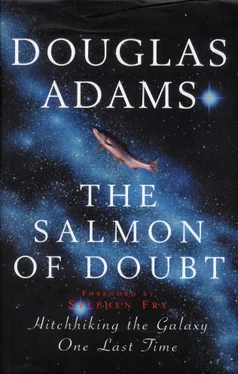And then in the evening they would trot off to their real home to be fed, watered, and put to bed for the night. Which seemed to me like a fine arrangement, because I got all the pleasure of their company, which was considerable, without having any responsibility for them. And it continued to be a fine arrangement till the day when Maggie turned up bright and early in the morning ready and eager to ignore me on her own. No Trudie. Trudie was not with her. I was stunned. I didn’t know what had happened to Trudie and had no way of finding out, because she wasn’t mine. Had she been run over by a truck? Was she lying somewhere, bleeding by the roadside? Maggie seemed restless and worried. She would know where Trudie was, I thought, and what had happened to her. I’d better follow her, like Lassie. I put on my walking shoes and hurried out. We walked for miles, roaming around the desert looking for Trudie, following the most circuitous route. Eventually I realised that Maggie wasn’t looking for Trudie at all, she was just ignoring me, a strategy I was complicating by trying to follow her the whole time rather than just pursuing my normal morning walk route. So eventually I returned to the house, and Maggie sat at my feet and moped. There was nothing I could do, no one I could phone about it, because Trudie didn’t belong to me. All I could do, like a mistress, was sit and worry in silence. I was off my food. After Maggie sloped off home that night, I slept badly.
Six weeks later I came back to work on a second draft. I couldn’t just call ’round and get the dogs. I had to walk around in the backyard, looking terribly obvious and making all sorts of high-pitched noises such as dogs are wont to notice. Suddenly they got the message and raced across the snow-covered desert to see me (this was mid-January now). Once they had arrived, they continually hurled themselves at the walls in excitement, but then there wasn’t much else we could do but go out for a brisk, healthy Ignore in the snow, Trudie stotted, Maggie bit her on the neck, and so we went on. And three weeks later I left again. I’ll be back again to see them sometime this year, but I realise that I’m the Other Human. Sooner or later I’m going to have to commit to a dog of my own.
Animal Passions (ed. Alan Coren; Robson Books; SEPTEMBER 1994).
The Rules In the old Soviet Union they used to say that anything that wasn’t forbidden was compulsory; the trick was to remember which was which. In the West we’ve always congratulated ourselves on taking a slightly more relaxed, commonsense view of things, and forget that common sense is often just as arbitrary. You’ve got to know the rules. Especially if you travel.
A few years ago—well, I can tell you exactly, in fact, it was early 1994—I had a little run-in with the police. I was driving along Westway into central London with my wife, who was six months pregnant, and I overtook on the inside lane. Not a piece of wild and reckless driving in the circumstances, honestly, it was just the way the traffic was flowing; but anyway I suddenly found myself being flagged down by a police car. The policemen signalled me to follow them down off the motorway and—astonishingly—to stop behind them on a bend in the slip road, where we could all get out and have a little chat about my heinous crime. I was aghast. Cars, trucks, and, worst of all, white vans were careering down the slip road, none of them, I’m sure, expecting to find a couple of cars actually parked there, right on the bend. Any one of them could easily have rear-ended my car—with my pregnant wife inside. The situation was frightening and insane. I made this point to the police officer, who, as is so often the case with the police, took a different view.
The officer’s next point was that I wasn’t in the universe, I was in England, a point that has been made to me before. I gave up trying to win an argument and agreed to everything so that we could just get out of there. As it happened, the reason I had rather overcasually overtaken on the inside lane was that I am very used to driving in the United States where everybody routinely exercises their constitutional right to drive in whatever damn lane they please. Under American law, overtaking on the inside lane (where traffic conditions allow) is perfectly legal, perfectly normal, and, hence, perfectly safe.
But I’ll tell you what isn’t.
I was once in San Francisco, and I parked in the only available space, which happened to be on the other side of the street. The law descended on me. Was I aware of how dangerous the manoeuvre I’d just made was? I looked at the law a bit blankly. What had I done wrong?
I had, said the law, parked against the flow of traffic.
Puzzled, I looked up and down the street. What traffic? I asked.
The traffic that would be there, said the law, if there was any traffic. This was a bit metaphysical, even for me, so I explained, a bit lamely, that in England we just park wherever we can find a parking space available, and weren’t that fussy about which side of the street it was on. He looked at me aghast, as if I was lucky to have got out of a country of such wild and crazy car parkers alive, and promptly gave me a ticket. Clearly he would rather have deported me before my subversive ideas brought chaos and anarchy to streets that normally had to cope with nothing more alarming than a few simple assault rifles. Which, as we know, in the States are perfectly legal, and without which they would be overrun by herds of deer, overbearing government officers, and lawless British tea importers.
My late friend Graham Chapman, an idiosyncratic driver at the best of times, used to exploit the mutual incomprehension of British and U.S. driving habits by always carrying both British and California driver’s licences. Whenever he was stopped in the States, he would flash his British licence, and vice versa. He would also mention that he was just on his way to the airport to leave the country, which he always found to be such welcome news that the police would breathe a sigh of relief and wave him on.
But though there are frequent misunderstandings between the Europeans and the Americans, at least we’ve had decades of shared movies and TV to help us get used to each other. Outside those bounds you can’t make any assumptions at all. In China, for instance, the poet James Fenton was once stopped for having a light on his bicycle. “How would it be,” the police officer asked him severely, “if everybody did that?”
However, the most extreme example I’ve come across of something being absolutely forbidden in one country and normal practice in another is one I can’t quite bring myself to believe, though my cousin swears it’s true. She lived for several years in Tokyo, and tells of a court case in which a driver who was being prosecuted for driving up onto the pavement, crashing into a shop window and killing a couple of pedestrians was allowed to enter the fact that he was blind drunk at the time as a plea in mitigation.
The Independent on Sunday, JANUARY 2000
Introductory Remarks, Procol Harum at the Barbican Ladies and gentlemen: Anybody who knows me will know what a big thrill it is for me to be here to introduce this band tonight.
I’ve been a very great fan of Gary Brooker and Procol Harum ever since thirty years ago when they suddenly surprised the world by leaping absolutely out of nowhere with one of the biggest hit records ever done by anybody at all ever under any circumstances. They then surprised the world even more by turning out to be from Southend and not from Detroit as everybody thought. They then surprised the world even more by their complete failure to bring out an album within four months of the single, on the grounds that they hadn’t written it yet. And then, in a move of unparalleled marketing shrewdness and ingenuity, they also actually left “A Whiter Shade of Pale” off the album. They never did anything straightforwardly at all, as anyone who’s ever tried to follow the chords of “A Rum Tale” will know.
Читать дальше










